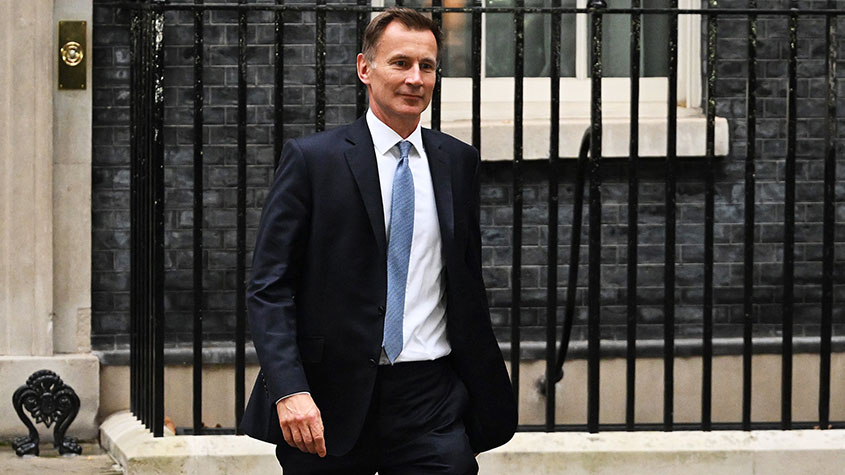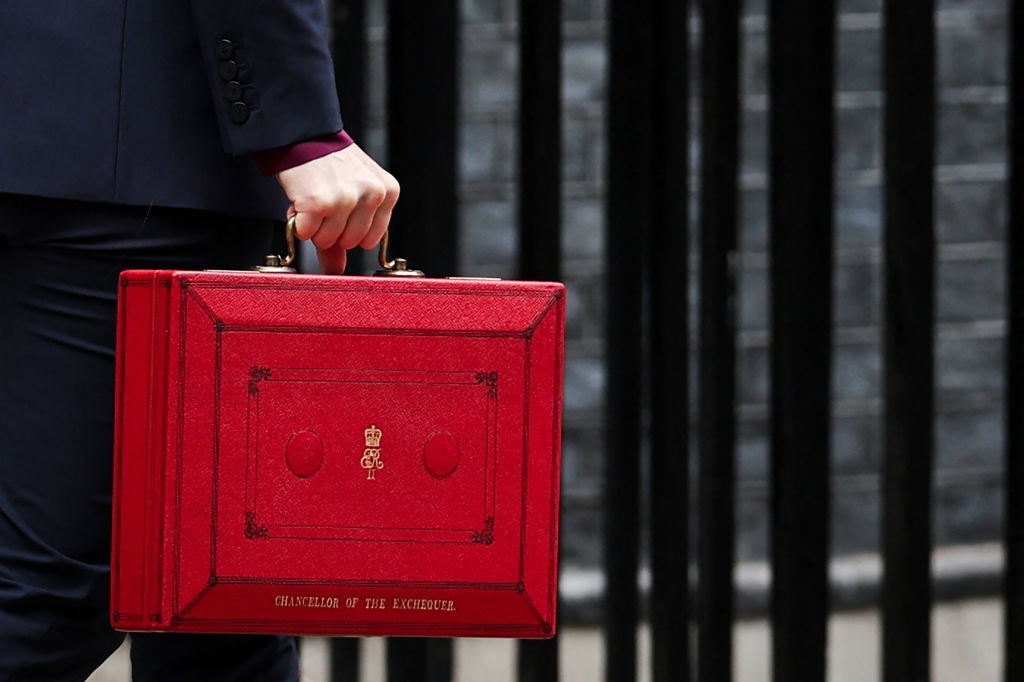What could be in the chancellor’s statement on 31 October?
After dismantling most of the mini-Budget in a series of U-turns, Jeremy Hunt will reveal the rest of his “medium-term fiscal plan” on Halloween. We look at what changes could be announced, and the potential impact on your personal finances


Get the latest financial news, insights and expert analysis from our award-winning MoneyWeek team, to help you understand what really matters when it comes to your finances.
You are now subscribed
Your newsletter sign-up was successful
Want to add more newsletters?

Twice daily
MoneyWeek
Get the latest financial news, insights and expert analysis from our award-winning MoneyWeek team, to help you understand what really matters when it comes to your finances.

Four times a week
Look After My Bills
Sign up to our free money-saving newsletter, filled with the latest news and expert advice to help you find the best tips and deals for managing your bills. Start saving today!
Jeremy Hunt, the new chancellor, is set to reveal the rest of his “medium-term fiscal plan” in less than two weeks’ time, after tearing up most of his predecessor Kwasi Kwarteng’s mini-Budget.
Hunt has warned ministers that spending cuts are coming, and that “decisions of eye-watering difficulty” will have to be taken to reduce government debt and calm markets.
The chancellor has already scaled back the Energy Price Guarantee, shelved plans to cut a penny off the basic rate of income tax, reversed the 1.25% cut to dividend tax and back-tracked on changing IR35 legislation.
MoneyWeek
Subscribe to MoneyWeek today and get your first six magazine issues absolutely FREE

Sign up to Money Morning
Don't miss the latest investment and personal finances news, market analysis, plus money-saving tips with our free twice-daily newsletter
Don't miss the latest investment and personal finances news, market analysis, plus money-saving tips with our free twice-daily newsletter
Experts say households should brace themselves for more bad news on 31 October, when the chancellor will publish the government’s fiscal rules alongside an Office for Budget Responsibility (OBR) forecast and further measures such as spending cuts and tax hikes.
“Given the events of the last few weeks it seems unlikely the new chancellor is going to present any ‘good news’ on taxation in the Medium-Term Fiscal Plan,” comments Adrian Lowery, financial analyst at the investing platform Bestinvest.
“The statement will reaffirm the reversals to Kwarteng’s ill-fated mini-Budget and clarify the fiscal outlook with detailed forecasts from the OBR. The focus will be on repairing the Tories’ fiscal credibility by further closing the deficit black hole that has opened up.”
Nimesh Shah, chief executive of the accountancy firm Blick Rothenberg, agrees, saying he doesn’t expect to see any “giveaways” – such as abolishing the unpopular high income child benefit charge or removing the tapered personal allowance when someone’s income reaches £100,000. “The tone under Jeremy Hunt is very different; the government is focused on maintaining tax receipts and cutting spending in order to reduce the debt cost.”
We look at what changes could be announced at the end of this month.
State pension triple lock could come under attack
There is growing speculation that the state pension triple lock could be scrapped. The triple lock – which means the state pension is guaranteed to increase each year in line with whichever is highest out of inflation, wages or 2.5% – is currently suspended until April 2023.
While Kwarteng said last month that he and the prime minister were “absolutely committed” to the triple lock, Hunt has offered no such assurance.
Yesterday he said: “I’m very aware of how many vulnerable pensioners there are and the importance of the triple lock but, as I said earlier, I’m not making any commitments on any individual policy areas, but every decision we take will be taken through the prism of what matters most to the most vulnerable.”
Pensioners received a 3.1% annual increase in April this year. Next April, if the triple lock is restored as planned, they could potentially see their payout rise by 10%, due to inflation running at a 40-year high.
If Hunt decided to scrap the triple lock for another year – or axe it completely – and uprate state pensions by wage growth instead (5.5%), pensioners would lose out on up to £430 a year, according to the investment platform AJ Bell.
“The costs associated with maintaining the triple lock next year are likely to be eye-watering – which is undoubtedly the reason the UK’s latest chancellor, Jeremy Hunt, is reluctant to commit to the policy,” says Tom Selby, head of retirement policy at AJ Bell.
“Clearly no politician wants to head towards a general election having applied a real-terms cut to pensioners’ incomes, and you would think No.10 will be fighting hard against such a measure. What we have here is a genuine tussle between politics and ensuring the public finances remain on a sustainable footing.”
According to Selby, abandoning the triple lock in favour of an earning-linked increase could save the Treasury an estimated £4bn – £5bn a year.
Another change to National Insurance?
Last month the government announced that the 1.25 percentage-point increase in National Insurance contributions (NICs), introduced by former chancellor Rishi Sunak, would be reversed on 6 November..
But Hunt could be tempted to look again at the policy as a way of raising the amount of money that flows into the Treasury’s coffers. Fiddling with NICs rather than income tax is arguably more palatable to voters (simply because many people don’t understand it), and avoids negative headlines of income tax being hiked.
Shah at Blick Rothenberg comments: “The 1.25% reversal to National Insurance is due to take effect from 6 November, but Jeremy Hunt may scale back the cut so that it only applies to basic-rate taxpayers (anyone earning less than £50,271) from next April – therefore, someone earning above the higher rate would pay National Insurance at 3.25% (rather than 2%).”
He adds that the chancellor could go further on tax increases, and “apply National Insurance to rental profits and capital gains” too.
Benefit increases could be cut
Benefits could also be in the firing line as part of Hunt’s cost-cutting spree.
The chancellor has refused to say whether benefits will rise in line with inflation, saying he will not make any “firm commitments”.
Benefit payments usually rise every April. Liz Truss has previously failed to commit to increasing benefits in line with inflation, and was expected to make a final decision by the end of November.
However, this could now be moved forward with Hunt making an announcement on 31 October instead.
Public spending could be slashed
Paul Johnson, director of the Institute for Fiscal Studies, says the chancellor will have to make “some scary decisions” on Halloween about spending cuts.
He adds: “Hunt will need to find a way of making his plans credible. That is likely to involve at least some cuts to planned investment and day-to-day spending [such as health, pensions, welfare, education and defence]. There are no easy options here.”
Speaking in parliament yesterday, Hunt refused to make commitments on defence spending, despite Truss promising to increase it to 3% of GDP by 2030 during her leadership campaign.
Get the latest financial news, insights and expert analysis from our award-winning MoneyWeek team, to help you understand what really matters when it comes to your finances.

Ruth is an award-winning financial journalist with more than 15 years' experience of working on national newspapers, websites and specialist magazines.
She is passionate about helping people feel more confident about their finances. She was previously editor of Times Money Mentor, and prior to that was deputy Money editor at The Sunday Times.
A multi-award winning journalist, Ruth started her career on a pensions magazine at the FT Group, and has also worked at Money Observer and Money Advice Service.
Outside of work, she is a mum to two young children, while also serving as a magistrate and an NHS volunteer.
-
 What is a care fees annuity and how much does it cost?
What is a care fees annuity and how much does it cost?How we will be cared for in our later years – and how much we are willing to pay for it – are conversations best had as early as possible. One option to cover the cost is a care fees annuity. We look at the pros and cons.
-
 How to navigate the inheritance tax paperwork maze in nine clear steps
How to navigate the inheritance tax paperwork maze in nine clear stepsFamilies who cope best with inheritance tax (IHT) paperwork are those who plan ahead, say experts. We look at all documents you need to gather, regardless of whether you have an IHT bill to pay.
-
 Is Britain heading for a big debt crisis?
Is Britain heading for a big debt crisis?Opinion Things are not yet as bad as some reports have claimed. But they sure aren’t rosy either, says Julian Jessop
-
 When is the Autumn Budget and what should you expect?
When is the Autumn Budget and what should you expect?Chancellor Rachel Reeves is set to deliver her second Autumn Budget next week – but what exactly does the fiscal event involve?
-
 UK wages grow at a record pace
UK wages grow at a record paceThe latest UK wages data will add pressure on the BoE to push interest rates even higher.
-
 Trapped in a time of zombie government
Trapped in a time of zombie governmentIt’s not just companies that are eking out an existence, says Max King. The state is in the twilight zone too.
-
 America is in deep denial over debt
America is in deep denial over debtThe downgrade in America’s credit rating was much criticised by the US government, says Alex Rankine. But was it a long time coming?
-
 UK economy avoids stagnation with surprise growth
UK economy avoids stagnation with surprise growthGross domestic product increased by 0.2% in the second quarter and by 0.5% in June
-
 Bank of England raises interest rates to 5.25%
Bank of England raises interest rates to 5.25%The Bank has hiked rates from 5% to 5.25%, marking the 14th increase in a row. We explain what it means for savers and homeowners - and whether more rate rises are on the horizon
-
 UK inflation remains at 8.7% ‒ what it means for your money
UK inflation remains at 8.7% ‒ what it means for your moneyInflation was unmoved at 8.7% in the 12 months to May. What does this ‘sticky’ rate of inflation mean for your money?